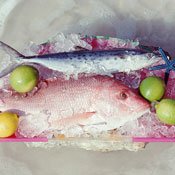Wednesday, May 19, 2010
When I casually mentioned to my brother that I was doing a column on cholesterol, his response was, "Oh! Cholesterol's delicious!"
I can't say I was shocked by his retort. One only needs to avail oneself of all the food-porn sites on the Internet to ascertain that many people share his sentiments.
Cholesterol is a complex subject, and this column should not take the place of medical advice or treatment. It's impossible to cover more than the basics here. Also, before embarking on any type of cholesterol-lowering program, exercise regimen, or before taking any herbal supplements, please consult a physician.
It's important to have some cholesterol in the body. Cholesterol naturally occurs in our cells and performs certain vital functions. The problem arises when we have too much cholesterol on board, especially the "bad" kind.
Cholesterol travels the bloodstream attached to proteins, called lipoproteins. There are three types of proteins, but two are most relevant: high-density lipoproteins (HDL), and low-density lipoproteins (LDL).
LDLs carry cholesterol through the body and deliver it to various organs and tissues. If your body has too much LDL—so-called "bad" cholesterol—it keeps circulating in the bloodstream. Over time, this circulating LDL gets smaller, changes composition, and sneaks into blood-vessel walls to form plaque, which can harden and build up to obstruct blood flow inside the blood vessel. This can lead to coronary artery disease.
HDLs, "good" cholesterols, pick up excess cholesterol in the bloodstream and take it to the liver for the body to dispose of. HDLs may also have anti-oxidant, anti-inflammatory and anti-clotting properties.
Doctors generally recommended that you keep your total cholesterol level below 200. Numerous factors can affect cholesterol levels, including a diet high in saturated fats, being overweight, smoking, having a sedentary lifestyle, and your age and gender. Prior to menopause, women generally have lower cholesterol levels than men. Poorly controlled diabetes can raise cholesterol levels, as can certain medications. Elevated cholesterol can run in families. The American Heart Association recommends that anyone over 20 years of age should have a cholesterol level check at least every five years.
Lots of options exist to control cholesterol. Exercise can increase HDL levels in some people. Moderate daily exercise can also help maintain weight and control diabetes and high blood pressure. Yoga is great. Walking is cheap. Gyms are everywhere. It's important to get moving and do something you'll enjoy, and even moderate activity can make a positive difference. If you haven't exercised in a while, consult your doctor about safely increasing your activity level.
The American Heart Association recommends that you limit your daily cholesterol intake to less than 300 milligrams, or less than 200 milligrams if you already have a history of heart disease. If you have high cholesterol, your doctor may prescribe a cholesterol-lowering drug. It's important to keep follow-up appointments with your doctor, as he or she will likely be monitoring your cholesterol and liver function.
Some foods and herbal remedies may be as beneficial as drugs, or can work with drugs to balance your cholesterol levels. Overall, learn to check food labels and avoid foods high in saturated fat. Foods high in omega-3 fatty acids, like fish, flaxseeds, olive oil and some nuts, can be beneficial.
Several other foods and herbal supplements may also be beneficial. Experts think that plant sterols work by competing with dietary cholesterol for absorption. WebMD mentions red yeast rice, ginger, turmeric, artichoke leaf extract, yarrow and holy basil. In addition to these herbals, soluble fiber found in plant foods like oat bran, flax seed, apples, lentils, and beans are beneficial. Soy-based proteins like tofu, soymilk, and edamame have been shown to help prevent heart disease.
The website eMedicinal lists several herbal recommendations from Dr. Gordon Chang. Guggal is an extract of the Indian herb Commiphora mukul and has been shown to reduce total cholesterol as well as LDLs. Niacin is also effective, but can be hard on the liver and can cause flushing of the skin; inositol hexanicotinate is chemically similar to niacin and may not have the side effects associated with the use of niacin. Policosanol and garlic may lower cholesterol.
Men should be aware that soy can increase estrogen levels. Before taking any herbal supplement, consult your doctor. Herbals also have side effects and can interact with other medications you may be taking. So respect them as you would any other drug.
http://MayoClinic.com and WebMD (http://www.webmd.com) are good sources of detailed information on cholesterol. The American Heart Association (http://www.americanheart.org), and The Cleveland Clinic Department of Nutrition and The Cleveland Clinic Heart Center (http://my.clevelandclinic.org) also provide good information.
